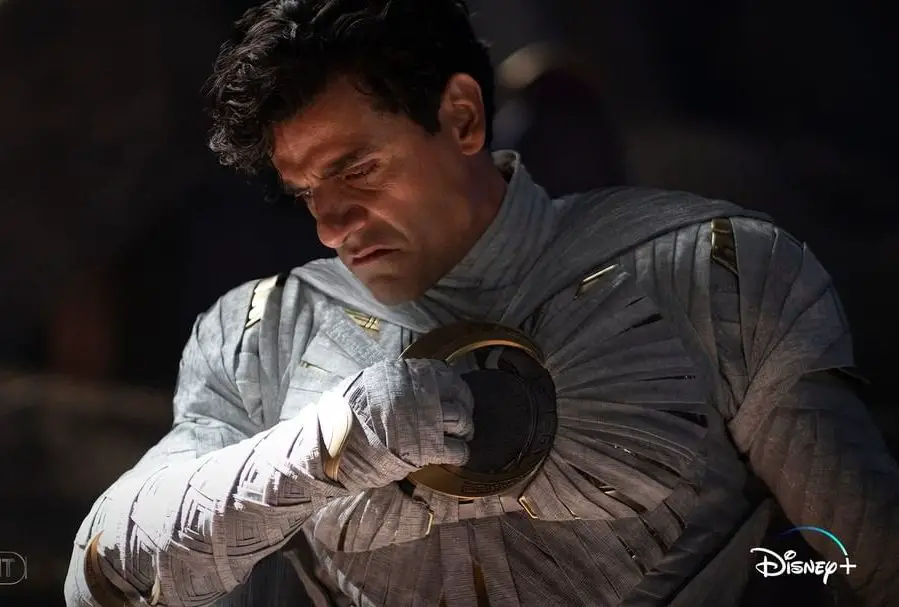Historically, the cinematic and psychiatric communities have always butted heads. Much of this is because mental health struggles are often exploited on-screen for cheap tension in thrillers and horror films. Despite much advocacy for changes in the industry, dissociative identity disorder (DID), previously known as “multiple personality disorder,” is always getting the short end of the stick. Popular media like “Split” or “Dr. Jekyll and Mr. Hyde” have continuously twisted this complex mental disorder into something terrifying, rare and extreme. The MCU’s “Moon Knight” is the newest show attempting to represent DID effectively, and thankfully, it hits more marks than it misses.
The titular character, Moon Knight, is out of place in the massive roster of superheroes that the MCU has built thus far. The series introduces us to Steven Grant, played by Oscar Isaac, a shy cashier at an Egyptian archeological museum in London. It’s immediately apparent that Steven isn’t just battling monsters and terrorists like the rest of Marvel’s protagonists, but rather some troubling mental health issues. Every night, he straps himself to his bed, lines his floor with sand and tapes his door shut, all of which are meant to prevent him from sleepwalking. Steven struggles with gaps in his memory and often mixes up dates, both of which he justifies as part of this “sleeping disorder.”
However, after a particularly scary evening, Steven starts to notice things being misplaced in his apartment, almost like someone else is living with him in his flat. Even though he’s alone in his home, he’s not alone in his head. Steven learns that his other identity is the result of DID and that he is an “alter” within his body, whose name is Marc Spector. Marc has a whole life of his own where he serves as an avatar to the Egyptian god of the moon, Khonshu, something that Steven was entirely unaware of.
DID is a complicated disorder to understand, especially since the psychiatric community itself is constantly adjusting definitions and learning new things about it. In short, DID is a psychological defense mechanism in which somebody’s mind “splits” into two or more distinct personas, known as alters, to better process traumatic experiences. Usually, each “alter” carries its own unique name, personality and memories, some of which might hold certain roles or significance to the host. Unfortunately, people with DID often experience rather intense dissociative episodes where they are susceptible to periods of amnesia or memory blackout.
In the case of Marc Spector, as explained in the show, he experienced an extremely traumatic incident with his brother as a child that resulted in losing him, while also sustaining physical abuse from his mother for a number of years. Because of that, he developed two different alters, Steven Grant and Jake Lockley, the latter of which has yet to make an appearance in the show. Steven serves as Marc’s “protector,” fronting when Marc is exposed to intense emotions regarding his past and family, guarding him against traumatic experiences that might otherwise make him too troubled to function on a day-to-day basis.
So how does this representation hold up? Though a rather low bar to clear, “Moon Knight” represents the disorder leagues better than most popular media has. To the public, the disorder carries a rather intense stigma, and the symptoms are often associated with things like violence and demonic possession. Typical narratives about DID only portray the extreme aspects of the disorder because they are the ones that are the most marketable as narrative mechanics, often resulting in alters propelling villains toward kidnapping and killing others. Though situations like these are possible, they are highly unlikely as there is nothing within the diagnosis that makes people with DID inherently dangerous. Often, the disorder isn’t an inconvenience to anyone but the person with the condition.
“Moon Knight” has put forth some encouraging changes. For one, Marc’s alters aren’t violent at all. Steven is quite the opposite, actively trying to prevent Marc from attacking others or putting them in harm’s way. The show does dramatize the instances of Marc switching between himself and Steven as a way to build tension and create off-screen violence, which still leaves DID associated with something dramatic and unknown. Additionally, the show has yet to introduce Jake Lockley, an additional alter in the original comics who tends to be the most violent of the three. There is potential that Marvel could misstep and portray Jake as a bloodthirsty alter that Marc and Steven must suppress, but hopefully, they continue with their careful handling of this aspect.
One of the biggest problems that DID faces in popular media is its association with the magical or divine, like it’s the symptom of something satanic or otherworldly. Original stories of Marc Spector treat his disorder as something entirely separate from his interactions with the Egyptian pantheon. It would be very easy for writers to make his DID a side effect of his involvement with Egyptian gods and monsters or try to tie it in with the MCU’s expanding multiverse but instead, it was developed in his childhood, separate from magic or mythology.
The most important detail of Marc’s DID, and the aspect that Marvel has handled the best, has to do with his character development. In the show and its source material, Marc entered his servitude to Khonshu with the assumption that the Egyptian god would “heal” him of his disorder. Over time, though, Marc starts to see his disorder as less of a hindrance and more of an essential part of who he is, embracing both Steven and Jake as valuable aspects of himself.
In the fourth episode, Marc and Steven meet as separate entities in the astral plane, and the first thing they do upon seeing each other is embrace like long-lost friends. This continues into Episode 5, with Marc explaining Steven’s role in helping him cope with his trauma and better integrating both of their identities into one collection of memories. It’s important to challenge the belief that DID is a disorder that needs to be cured or eliminated, or that alters are rivals to the person with DID that they need to defeat. Steven put it best in Episode 2 when he said, “I’m not broken. Just need some help, maybe.” Though the symptoms can be difficult to cope with, they are best met with acceptance and understanding.
A lot of these positive aspects are because the writing team for “Moon Knight” consulted mental health professionals and those dealing with the disorder in order to properly represent it. Though Oscar Isaac doesn’t have experience with DID himself, he wanted to approach this role as a “journey of healing and living with dissociative identity disorder.” A lot of representation is best met this way: by making sure there are people in the writer’s room that understand what it’s like to walk in those shoes.
“Moon Knight” reached its conclusion on May 4, and hopefully the series marks the start of a much brighter line of positive representation for those with dissociative identity disorder.

















